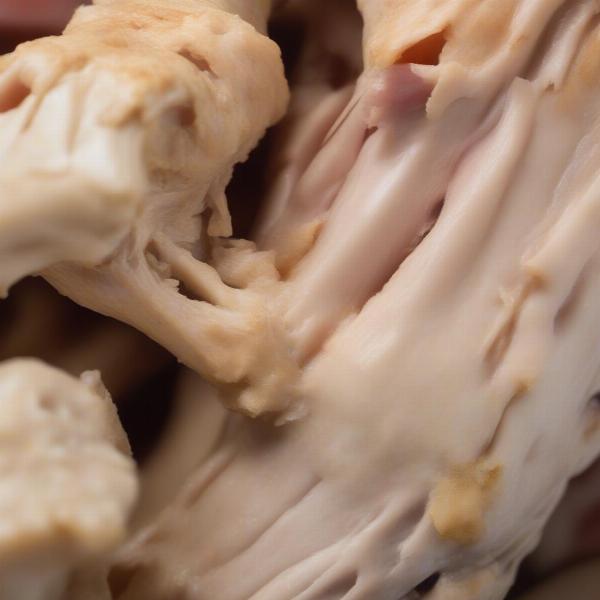Choosing the right chew toys for your dog can be a daunting task, especially when it comes to bones. While dogs love to gnaw, not all bones are safe. This guide delves into the world of safe bones for dogs, providing you with expert advice on selecting appropriate options, understanding the risks associated with unsafe bones, and ensuring your furry friend enjoys a healthy and happy chewing experience.
Understanding the Risks of Unsafe Bones for Dogs
Many commercially available bones, especially cooked bones, pose significant risks to dogs. Cooked bones become brittle and can easily splinter, causing potential harm. These splinters can lead to choking, internal punctures, blockages, and painful dental injuries.  Dangers of Cooked Bones for Dogs
Dangers of Cooked Bones for Dogs
Rawhide chews, often marketed as a safe alternative, can also present choking hazards and digestive issues. Always supervise your dog when they are enjoying any chew, including rawhide.
Choosing Safe Bones for Dogs: What to Look For
So, what bones are safe for dogs? Generally, raw bones from appropriate sources are a better option than cooked bones. Look for bones that are larger than your dog’s mouth to prevent swallowing and choking.
Consider your dog’s size and chewing habits. A small dog may not be able to handle a large bone meant for a larger breed. Supervise your dog’s chewing sessions and remove any small pieces or splinters that break off.
Recommended Safe Bone Options for Dogs
Several types of raw bones are generally considered safe for dogs, including:
- Beef bones: Large, raw beef femur bones and knuckle bones can provide hours of chewing enjoyment.
- Bison bones: Similar to beef bones, bison bones are durable and long-lasting. dogs and raw chicken bones
- Lamb bones: Raw lamb bones are a good choice, especially for smaller dogs.
Remember, even with safe bones, supervision is key. Always monitor your dog while they are chewing to prevent any potential issues.
Alternatives to Natural Bones
If you are still hesitant about giving your dog natural bones, there are several excellent alternatives available.
- Nylon bones: Durable nylon bones can withstand even the most enthusiastic chewers. are nylon bones safe for dogs
- Rubber toys: Look for sturdy rubber toys specifically designed for chewing.
- Dental chews: These chews can help clean your dog’s teeth while providing a satisfying chewing experience. shin bones for dogs
“Providing safe and appropriate chew toys is essential for a dog’s dental health and overall well-being,” says Dr. Emily Carter, DVM. “Always choose chews that are sized appropriately for your dog and supervise their chewing sessions.”
Maintaining Dental Health with Safe Chewing
Chewing helps to keep your dog’s teeth clean and their gums healthy. Safe bones and chew toys can act as a natural toothbrush, scraping away plaque and tartar buildup. what dog bones are safe for dogs
“Remember to offer a variety of chew toys to keep your dog engaged and prevent boredom,” adds Dr. Carter. “This can also help prevent destructive chewing behaviors.”
Conclusion
Providing your dog with safe bones and chew toys is crucial for their health and happiness. By understanding the risks associated with unsafe bones and choosing appropriate alternatives, you can ensure your furry friend enjoys a safe and satisfying chewing experience. Remember to always supervise your dog while they are chewing and consult with your veterinarian if you have any concerns. bison bones for dogs
FAQ
- What bones are absolutely off-limits for dogs? Cooked bones of any kind, especially poultry and pork bones, should never be given to dogs due to their tendency to splinter.
- Can puppies have bones? Yes, puppies can have bones, but they should be appropriately sized and supervised.
- What should I do if my dog swallows a bone splinter? Contact your veterinarian immediately.
- Are there any benefits to giving my dog bones? Chewing on bones can help clean teeth, provide mental stimulation, and satisfy a dog’s natural chewing instinct.
- How often should I give my dog a bone? This depends on the type of bone and your dog’s individual chewing habits. Consult with your veterinarian for personalized advice.
- What are some signs that my dog is having trouble with a bone? Signs of trouble include excessive drooling, gagging, vomiting, or straining to defecate.
- Can I give my dog a bone every day? It’s generally recommended to offer bones in moderation, a few times a week.
ILM Dog is a leading international dog website dedicated to providing expert advice on dog care and wellbeing. We offer valuable resources on breed selection, health and medical care, training, nutrition, grooming, exercise, puppy care, senior dog care, and travel. We also provide expert insights into the best products and accessories for your canine companion. For professional guidance and personalized advice, contact our experts at [email protected] or +44 20-3965-8624. ILM Dog offers a wealth of knowledge to help you provide the best possible care for your beloved pet.